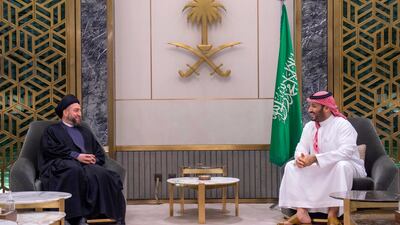Iraqi Shiite cleric Ammar Al Hakim met Saudi Arabia's Crown Prince Mohammed bin Salman on Thursday evening, during an official visit to the kingdom amid Baghdad's ongoing political crisis.
Tension has been high for months between Shiite cleric and political leader Moqtada Al Sadr and rival bloc the Co-ordination Framework, which consists of Shiite parties with strong ties to Iran.
A former leader of the Islamic Supreme Council of Iraq, Mr Al Hakeem is head of the National Wisdom Movement political coalition — part of the Co-ordination Framework.
However, Mr Al Hakeem's team said his visit to the port city of Jeddah was not due to the political impasse in Baghdad.
“Sayyid Ammar Al Hakeem's visit to Saudi Arabia is not related to the current political crisis in Iraq,” said Mohammed Shummary, chairman of Sumer Foundation for International Affairs, a Baghdad-based non-profit and independent foundation, and a close aide to Mr Al Hakeem.
“Saudi policy has changed positively during last years to be more open to different Iraqi components.
“So, for years they have been keen to receive Iraqi leadership.”
Mr Shummary accused social media accounts of spreading false news about the purpose of the visit.
“The problem was with the timing before. Now, there was an agreement on the dates a long ago. The visit is not related to the political crisis in Iraq, as some bloggers and Twitter fake accounts try to spread,” Mr Shummary told The National.
“Sayyid Al Hakim recently visited some other regional countries, and he may visit other countries in future,” he said.
Saudi Arabia wants to “send a message that it is close to all Iraqi parties, as part of its policy towards Iraq”, Mr Shummary said.
Months of bickering has stalled efforts to form a new Iraqi government, following last October's election that saw Mr Al Sadr bloc win the most for any group — 73 seats in the 329-seat Parliament.
Last month, Mr Al Sadr's supporters stormed Parliament in Baghdad's heavily fortified Green Zone, protesting against a nomination for the new prime minister.
Tension mounted as the Co-ordination Framework held counter demonstrations, highlighting the deep political gap between Iraq's rival Shiite blocs.
On Thursday, some Iraqi politicians met in a bid to resolve the political impasse — although Mr Al Sadr's group did not attend.
Mr Hakim's office stressed the importance of resolving Iraq's political crisis without foreign intervention, following his meeting with Prince Mohammed.
“Iraq and Saudi Arabia have an economic, regional and international weight,” it said.
“Dialogue between the various parties is the best way to reach satisfactory solutions to the current political impasse in Iraq,” state news agency INA reported Mr Hakim's office as saying.
Mr Hakim was quoted as saying that Iraqi issues should be resolved internally. “Solutions should remain Iraqi without external pressure.”
Saudi state news agency SPA said Iraqi and Saudi officials spoke about topics of “mutual interest”.
Iraqi held early elections in October to respond to pro-reform demonstrations that took place the year before.
Since then, political elites have been engaging in political wrangling.


